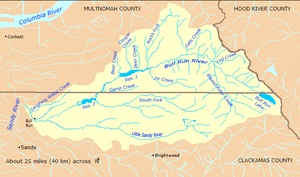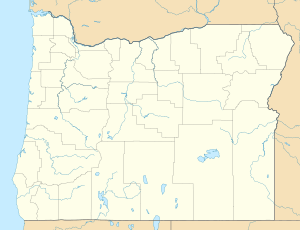North Fork Bull Run River facts for kids
Quick facts for kids North Fork Bull Run River |
|
|---|---|

Bull Run River watershed
|
|
|
Location of the mouth of the North Fork Bull Run River in Oregon
|
|
| Country | United States |
| State | Oregon |
| County | Multnomah County |
| Physical characteristics | |
| Main source | Mount Hood National Forest Palmer Lake, Multnomah County, Oregon 45°33′52″N 121°59′47″W / 45.56444°N 121.99639°W |
| River mouth | Bull Run River Bull Run Reservoir 1, Multnomah County, Oregon 1,096 ft (334 m) 45°29′38″N 122°02′06″W / 45.49389°N 122.03500°W |
| Length | 6 mi (9.7 km) |
| Basin features | |
| Basin size | 8.32 sq mi (21.5 km2) |
The North Fork Bull Run River is a tributary, about 6 miles (10 km) long, of the Bull Run River in the U.S. state of Oregon. Part of the system that provides drinking water to the city of Portland, it flows generally south through a protected part of the Mount Hood National Forest in Multnomah County. It joins the Bull Run River at Bull Run Reservoir 1.
Course
The river, which begins at Palmer Lake, slightly southeast of Palmer Peak, flows south and slightly west through Multnomah County and the Mount Hood National Forest within the Bull Run Watershed Management Unit (BRWMU). It receives an unnamed tributary from the right as it passes through Latourell Prairie. Another unnamed tributary enters from the left just before the North Fork reaches a United States Geological Survey (USGS) stream gauge and enters Bull Run Reservoir 1, which is part of the Bull Run River mainstem. The North Fork has no named tributaries. Its mouth is roughly 13.5 miles (21.7 km) from the confluence of the Bull Run River with the Sandy River.
Discharge
Since 1965, the USGS has monitored the flow of the North Fork Bull Run River at a stream gauge at the river mouth. The average flow between then and 2007 was 72.6 cubic feet per second (2.06 m3/s). This is from a drainage area of 8.32 square miles (21.55 km2). The maximum flow recorded during this period was 9,700 cubic feet per second (270 m3/s) on January 20, 1972, probably affected by a surge of water related to a landslide. The minimum was 8.6 cubic feet per second (0.24 m3/s) on October 19–29, 1987.
Watershed
The Bull Run River watershed, which includes the North Fork Bull Run River, drains 139 square miles (360 km2). The basin, which is the main source of Portland's drinking water, is largely restricted to uses related to water collection, storage, treatment, and forest management. The North Fork Bull Run River basin of 8.32 square miles (21.5 km2) amounts to about 6 percent of the total Bull Run River watershed, which is managed by the Portland Water Bureau and the United States Forest Service.


